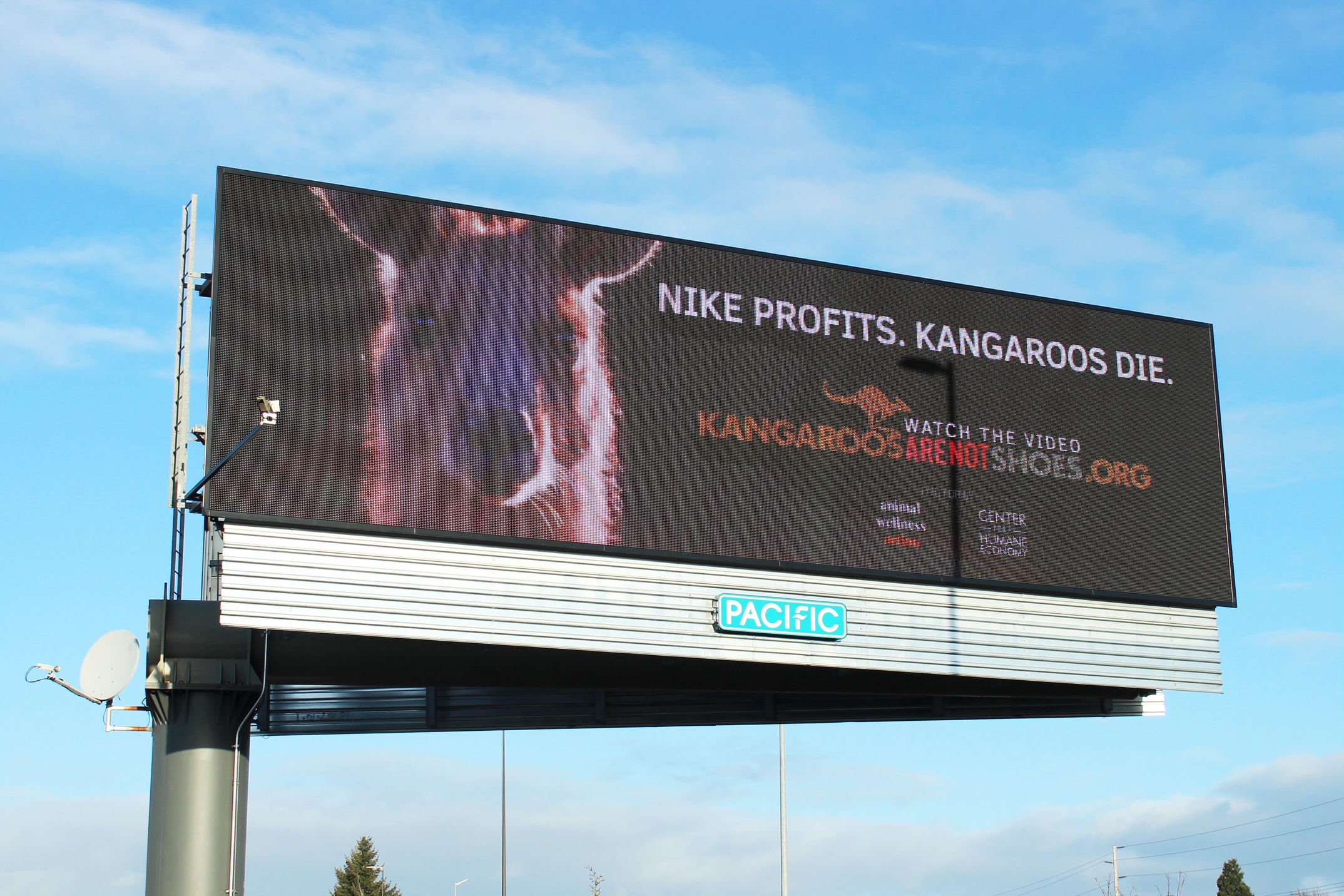Portland, OR — Just in case Nike executives are missing the message from millions of social media hits, 60,000 petition signatures, a newly introduced Kangaroo Protection Act in Congress, and one very powerful short film, strategically placed billboards in the Portland metro area will make sure they know: Vast numbers of people around the world oppose their role in the slaughter of millions of wild kangaroos to make soccer shoes.
“Nike profits. Kangaroos die.” reads the digital billboard along U.S. Highway 26 at an offramp for Nike executives and other drivers to see near Nike World Headquarters in Beaverton, OR. Other billboards along U.S. Highway 26 are visible to Nike board members and executives flying into or out of Hillsboro Airport on corporate jets.

Nike executives and other drivers reading the billboards are invited to visit our Kangaroos Are Not Shoes website to view the 60-second film produced by Hollywood filmmakers Gavin Polone and Derek Ambrosi that’s going viral via celebrity social media. Watch the video here.
“Nike must exit the kangaroo killing business,” says Wayne Pacelle, president of the Center for a Humane Economy. “The company has already pioneered the use of alternative materials, so the use of the skins of the animals is entirely unnecessary. We no longer kill buffaloes for coats or egrets for feather hats, and time to end using kangaroos for footwear.”
As the world’s largest and most influential sportswear manufacturer, Nike has an outsized role in driving the killing of kangaroos. It is among the nine brands selling some 72 models of kangaroo leather soccer cleats to American athletes. Here’s the first ever list.
Nike, which depends on its alignment with the sports world, is angering sports stars who have also called on Nike to stop manufacturing “k-leather” cleats.
“We don’t treat sports as a cordoned-off enterprise set apart from the rest of world and its swirl of social concerns,” said Dotsie Bausch, an Olympic cycling silver medalist (2012), soccer gold medalist Heather Mitts, track-and-field gold medalist David Verburg, and other elite athletes. “That means we care about the things we wear, the supply chain that allows them to be fabricated, and the precious world that we all inhabit with animals.” Their letter to Nike is available here.
Commercial shooters in Australia’s outback, working at night with spotlights, kill two million kangaroos a year, with soccer cleats the leading product made from their skin. After females are killed, hundreds of thousands of joeys (their young) either scramble away to a slow death or get a “concussive blow” to the brain, which often means having their heads slammed against truck bumpers.
Delivering blunt force trauma to joeys, and aiming for a kangaroo’s head from as far away as 200 meters, are in the Australian government’s Code of Practice for recommended methods of killing kangaroos. These unenforced “government guidelines” are commonly invoked by Nike to claim kangaroo killing is “well regulated” and “sustainable.”
“This is the world’s largest commercial wildlife slaughter on land — ten times larger than Atlantic Canada’s notorious seal-killing industry, ” adds Pacelle. The U.S. has banned imports of seal skins since 1972 and now a bill before Congress proposes to do the same with kangaroo parts. The Kangaroo Protection Act, H.R. 917, was introduced last month by Representatives Salud Carbajal, D-Calif., and Brian Fitzpatrick, R-Penn., to ban the sale of all kangaroo-sourced products in the United States, including Nike’s kangaroo shoes.
Australia’s leading animal welfare groups, including Animal Justice Party, Animals Australia, Australian Wildlife Protection Council, Winsome Constance Kindness Trust, Kangaroos Alive and many others support the campaign demanding an end to the commercial slaughter of kangaroos.
Billboard Locations:
(1) Near Nike HQ on U.S. Highway 26, 0.2 miles east of the NW 185th Avenue exit — map
(2) US Highway 26 (Tualatin Valley Highway) just east of SW 170thAvenue both directions — map
To find out why modern soccer shoes are scoring higher marks by using synthetics and fabrics instead of old-fashioned kangaroo skin, watch this video from a global expert.
For campaign information:


